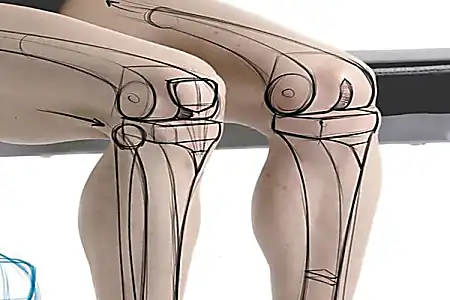Israel's new gov't proposes controversial reforms to justice system

Yariv Levin published his plan for reform of the legal system before an evening press conference and one day before the High Court will hear the case against Arye Deri.
Justice Minister MK Yariv Levin at an evening press conference on Wednesday presented his plan for reform of the legal system, which featured changes to key legal principles and institutions that would strengthen the legislative and executive branches at the expense of the judicial branch.
“We go to the polls, vote, choose, but time and time again people we didn’t choose decide for us,” said Levin. He decried what he said was a constitutional crisis and the increasing judicial intervention in government decisions.
Levin chose to present the plan less than 24 hours before the High Court was to hear the case against Shas chairman MK Arye Deri’s appointment as a minister – a highly contentious issue that, if the judges strike down his appointment, would serve as more fodder for Levin to decry judicial intervention.
According to the plan, the makeup of the Judicial Appointments Committee will change in order to give politicians a majority. The nine-person committee’s current makeup includes three High Court justices, four politicians – one of whom is the Justice Minister – and two representatives of the Israeli Bar Association (IBA). There needs to be a majority of at least seven votes in order to approve an appointment.
Levin proposed to replace the two IBA representatives in favor of two more politicians, one from the government and another from the Knesset. This would give politicians a 5-4 majority, but still give the three High Court justices veto power.

“The judges choose themselves in chambers without protocol,” said Levin, calling for what he called “equal representation.”
A second part of the plan is an Override Clause with a majority of 61 MKs, as well as a provision that will prohibit the High Court from hearing appeals against Basic Laws. This will essentially enable any coalition to override High Court decisions. In addition to the Override Clause, Levin called for the regulation of the Judicial Review, saying that the striking of laws would require a special majority. The only case in which a law would be immune to override would be if all 15 justices agree to strike it down, he said.
“No more court hearings on Basic Laws,” said Levin. “No more disqualification of Knesset laws without authority. Instead, the court will act within the Basic Laws and will not be above them.”
The limits of judicial review are one of the issues of debate in the “Deri Law” case. Critics of the amendment of a Basic Law – to allow Deri to be appointed a minister despite his criminal offenses – have argued that the procedure of the amendment can be addressed by the court, while respondents have argued that the distinct separation of powers means that the High Court has no authority to interfere with the Knesset’s constitutive authority.
A third part of the plan is to cancel the “legal unreasonableness” factor, which the High Court can use to cancel decisions made by the government due to it being “extremely” unreasonable.
Announced a day before High Court can use this to block Deri's appointment
“There’s no such thing as a reasonableness clause,” said Levin. “When I was a student, I really wanted to know where one learns what ‘reasonableness’ is, but couldn’t find it anywhere. It is just an excuse for judges to insert their worldviews,” Levin claimed.
But the High Court may use this exact factor to block Deri’s appointment as Health and Interior Minister – and this was even the position of Attorney-General Gali Baharav-Miara.
Deri was given a one-year suspended jail sentence in January 2022. Jail sentences bar citizens from serving as ministers for seven years, if their actions included moral turpitude. The Central Election Committee chairman, who is a High Court justice, was supposed to decide whether or not his actions included moral turpitude – but the Knesset last week passed a law so that it only applied for actual jail sentences, not suspended ones, thus avoiding the CEC chair’s decision.
On the heels of the attorney-general’s position against Deri, Levin also said his plan rejected the “insubordination” of legal advisers to the government.
“When they represent the government, they should represent the government, not their private opinion,” he said.
The relation between the A-G’s office and the government is terse as Netanyahu’s coalition partners campaigned during the general election for the division of the office, and the prime minister is in the midst of his corruption trials.
In response to claims that Levin had intentionally chosen to present the plan on the eve of Deri’s hearing to serve as “a pistol to the head of the court”, he said that he had been working on the judicial reform for decades, and it was an important general endeavor – not targeting any specific case.
Finance Minister and head of the Religious Zionist Party Bezalel Smotrich, in a joint congratulatory message with newly appointed Constitutional Committee chairman MK Simcha Rothman, expressed their pleasure with the plan.
“We are ‘restarting’ the judicial system tonight. Minister Yariv Levin’s plan to reform the judicial system is in line with the ‘Law and Justice’ program that we launched on the eve of the elections. We received a full mandate to strengthen public trust in the judicial system and strengthen the State of Israel as a Jewish and democratic state,” they said.
“Justice Minister, we are all rallying behind you to lead this historic and important move.”
Rothman added that he had instructed the Constitution Committee team to assist him in pushing through the reforms.
“In the name of God, we will do and succeed!” he exclaimed.
Opposition leader MK Yair Lapid responded on Twitter that “not only will we fight in any way possible against every single one of the steps that Levin announces tonight, [but] I am declaring in advance that we will cancel them on the day we return to govern. Whoever conducts a one-sided revolution of Israel’s governing system, needs to know that we are not committed to it in any way.”
Labor leader MK Merav Michaeli published a video in which she said that “this is not how a government behaves – it is how a mafia behaves. If anyone had any doubts about the intentions of this government’s ‘legal reforms’, Yariv Levin comes and puts a gun on the table the day before the Supreme Court debate on the appointment of the convict Arye Deri. Right-wing voters, this is not what you voted for: not for them taking away the protection that the Supreme Court gives you.”
National Unity Party leader MK Benny Gantz wrote on Twitter, “This is not a reform – it is a coup d’état.”
Former IDF chief of staff and National Unity No. 3 MK Gadi Eisenkot wrote on Facebook that the reforms were “nothing less than an attempt at extortion and psychological warfare against the judicial system.
“Levin’s plan to pass the Override Clause with a 61-MK majority, canceling the legal reasonableness factor, replacing lawyers with politicians in the Judicial Appointments Committee and other clauses that will be known later, are a violation of the delicate balance between the authorities that preserves democracy in Israel,” he said.
“Carrying out these steps on the eve of a hearing at the High Court is nothing less than an attempt at blackmail and psychological warfare against the judicial system which, in proper times, we used against our enemies,” Eisenkot wrote.
Israel Bar Association head Avi Chaimi said that “the arrow is out of the bag. The new government wants power without limits, without supervision and without restraint and to turn the State of Israel from a Jewish, democratic and liberal state into a dark state. The timing of the incoming Justice Minister’s announcement, on the eve of hearings at the High Court, is certainly not accidental and is an anti-democratic move in itself, designed to threaten the judges of the Supreme Court and harm their independence to decide according to their best judgment.










.jpeg)
Comments
Post a Comment